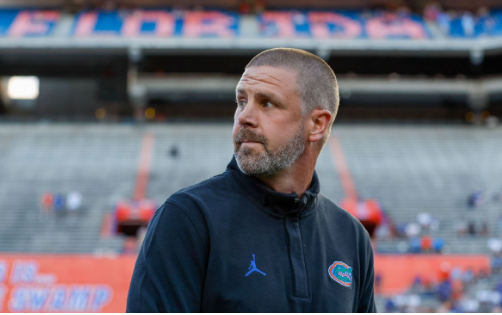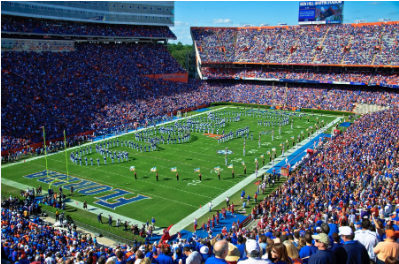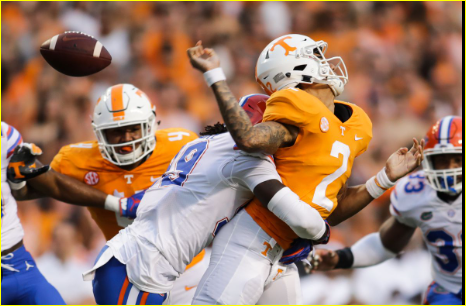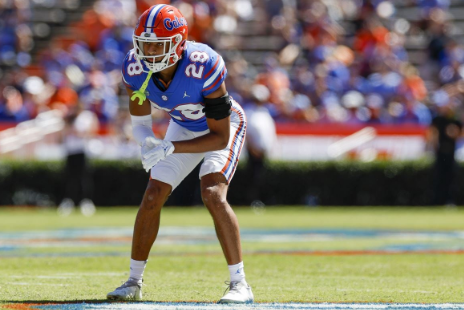I frequently think about the first thing I posted on my first Gator football website, a prelude to the 2006 season. It was intended to sound philosophical and creative; in retrospect, the execution was not as brilliant as I believed at the time. It was a subtle way of implying that the Gators could win a national championship if everything went right, and guess what? They succeeded because just enough things went their way.

The only thing I reiterated in that post was my belief that the season would be characterized by the interaction between “a coach and a quarterback”. The quarterback in question was not Tim Tebow, but Chris Leak, who formed half of an unusual couple with Urban Meyer. Neither would have chosen the other from the start — Leak was not a good fit for the 1.0 version of Meyer’s spread option, and both were aware of it — but now they had a road to immortality if they could just work out their differences.
I’ve been thinking lately that the 2024 season may likewise come down to a coach and a quarterback, but in a far different fashion than what we saw 18 years ago.
Billy Napier and Graham Mertz share some similarities. Napier was a promising young coach who was elevated to play-calling coordinator at age 29. He was let go after one strong season and one dismal season.
Mertz was and is the highest-rated quarterback ever signed by Wisconsin. His first game was impressive: 20-for-21, 248 yards (11.8 per attempt), five touchdowns, and no interceptions against a struggling Illinois squad. He’s been after that performance ever since.
He got close in some statistical ways against other bad Big Ten teams over the years, but nothing compares to lighting up a team, even an awful squad, in his first career start last year, when he helped the Gators defeat South Carolina. Even then, the Gamecocks finished 5-7. The fundamental cause for the heroics in the first place was UF’s own porous defense.
After being dismissed by Clemson, Napier rehabbed at the Nick Saban Home for Wayward Coaches, including a year at Colorado State under Jim McElwain. He was famously — or infamously, depending on your point of view — overlooked for the coordinator position in Tuscaloosa. Before taking over as head coach at Louisiana, he spent a season at Arizona State. SEC schools did come calling, including Auburn the year before Florida, but they were more interested in his recruitment and managerial approach than his offensive architecture.
The Mertz era at Madison ended without the accolades that Badger fans had hoped for when he signed. After he entered the portal, there was no rush for Mertz’s services. The enthusiasm around his high school recruitment had largely dissipated by then.
One coach had a higher opinion of him than of any other quarterback throughout that portal cycle. That’s what the coach says publicly. The two met, and it was a match. The remainder of history is still being written.
The coupling of Napier and Mertz has immediately strengthened the latter’s legacy. He walked in and set three records in his first year as head coach: most consecutive attempts without an interception (239), most consecutive completions (19), and highest single-season completion percentage (72.9%).
Those records, while better than some possible alternatives, are indicative of a general risk aversion. When Mertz went longer than about 15 yards down the field with throws, things got increasingly dicey. Some passes completed. More didn’t.
Still, Mertz proved to be a gutsy leader who kept the Gators in some games when the defense simply did not pull its weight. With a lesser signal caller, the team goes no better than 4-8 due to dropping the aforementioned game in Columbia.
However, while Napier is still waiting for a career boost from his move to Gainesville, it is worth noting that he is the reason Mertz is wearing orange and blue in the first place. You can’t separate the two. Mertz honestly and dramatically improved his performance at Wisconsin, thanks in part to Napier’s mentorship and the fact that he ran the offense.
Florida is currently facing a daunting schedule, and Napier is in a seat that, depending on who you ask, ranges from heated to scorching. While that sounds like a recipe for being too tight, the best way forward is for Napier and Mertz to help each other let it out.
Mertz will never be Rex Grossman in terms of intermediate-to-deep passing, but he was at his best at Williams-Brice because he was loose and free. The inhibition that he had prior to the game looked to fade throughout the game, but it would return later in the season. He played with great freedom, which was both entertaining and effective. Carolina’s weak defense allowed Mertz to do so, but the ’24 slate doesn’t leave much room for trying to win by dinking and dunking.
Taking a step back, Mertz’s legacy at Florida is similar to Feleipe Franks’ at Arkansas. Both were high-profile recruits who failed to live up to expectations at their first colleges. Both transferred and had successful rebound seasons on disappointing teams. If Mertz had not returned for another round, his journey would be similar, but he would not have had the opportunity to play tight end in the NFL.
If Mertz truly lets loose and goes for it, it may end badly. He may not improve on longer throws, resulting in more interceptions. With fewer easy throws, his completion rate might plummet, and he may find his playing time being eaten away by the guy who is clearly the future sitting at quarterback 2.
But, honestly, he has nothing to lose. His 2023 performance, despite missing the final game due to injury and not winning as many games as he would have liked, shown that he was far superior to his performance at Wisconsin. That is no longer an issue. However, the legacy he has to safeguard, such as it is, is not much different from Franks’ in Arkansas.
That is, Mertz’s name will remain in the UF record book until someone outperforms him, but he will be little more than a trivia question answer in a few decades. The key to not being just another post-Tebow quarterback Who’s Not Kyle Trask is outperforming himself by building on his success in 23. Excelling against the 2024 schedule means he can’t play as securely.
The same is true for Napier, whose standing is far less certain. With the exception of Ron Zook and Napier, every UF coach since Spurrier has won ten games or more. Zook helped build the majority of the 2006 championship squad and never missed a bowl game. Napier has significantly improved the talent situation, but it could all be for naught if he is sacked, given the current free-transfer era. The concept of one coach replenishing the cabinets for the next one may be antiquated.
If the South Carolina game was Mertz’s peak in ’23, the Tennessee game was Napier’s. However, the examples could not be more different. The game in Columbia demonstrated the importance of Mertz truly letting loose. The game versus the Vols highlighted the dangers of Napier’s conservative temperament.
UF opened up an unexpectedly big 26-7 halftime lead. Napier called only four pass plays after the break, and the Gators scored three points. The gamble was that Joe Milton’s deep ball accuracy would be insufficient to bring UT back. After all, Milton’s scattershot passing was a major reason for the Gators’ large lead at halftime. In fact, the bet paid out in the end.
But Milton did not convert zero deep balls; in fact, he connected on one to get within two points midway through the fourth quarter. Napier replied with six straight run plays, and the Vols grabbed the ball with three and a half minutes remaining with a 13-point disadvantage. Are the Gators in dire straits? Obviously not, but it was a defense that had developed the habit of surrendering big plays against a quarterback who could throw it a long way. It wasn’t game over, either.
Mertz and Napier both need to play more aggressively than they did last season. There are reasons why they acted the way they did last year that had nothing to do with nebulous concepts like “legacy” and everything to do with a lack of proven depth at receiver, a relative lack of time working together, and a defense that was about as reliable at holding a lead as a preschooler is at guarding a bowl of candy.
All three of these difficulties should improve by 2024. Tre Wilson and Kahleil Jackson return out wide after significant roles, while Elijhah Badger and Chimere Dike (a former Mertz colleague at UW) add to their experience. Mertz has spent an additional year in the system compared to last season. Ron Roberts taking over as the defense’s head coach, combined with a number of crucial transfers fortifying the two-deep, should stop the bleeding and lead to some level of improvement.
The most, if not all, of the obvious flaws raised a year ago have been addressed in some form. All that remains is for a coach and a quarterback to overcome their reservations and leave the excessive small ball in the past.
The 2024 campaign will mostly revolve around Napier and Mertz. Their fortunes are intertwined. Neither can completely shine out without the other standing close beside him. It’s not a question of whether they’ll go down in program history together; rather, it’s about how they shape their place in that history based on how aggressively they act this fall.



